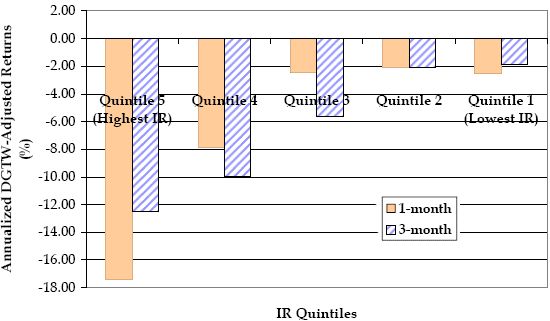Do short sellers avoid highly volatile stocks, and thereby leave them overvalued? If so, when short sellers do attack volatile stocks, is the level of overvaluation therefore compelling? In the August 2006 update of their paper entitled “Costly Arbitrage and Idiosyncratic Risk: Evidence from Short Sellers”, Ying Duan, Gang Hu and David McLean test the hypothesis that short sellers tend to avoid stocks with high idiosyncratic risk because of the high cost of hedging such risk. Using data for stock prices, short interest levels and other factors spanning 1988-2003, they find that:
- High short interest predicts low future returns only for stocks with high idiosyncratic risk. A high short interest, high idiosyncratic risk portfolio underperforms a high short interest, low idiosyncratic risk portfolio by 1.24% per month. (See chart below.)
- Conversely, idiosyncratic risk predicts returns only for high short interest stocks.
- Heavily shorted stocks with small market capitalization, low price, low dollar volume and low liquidity have abnormally low future returns. Heavily shorted stocks with low-to-moderate transaction costs do not. However, idiosyncratic risk is a better predictor of abnormal returns than any other inhibitor of short selling.
The following chart, taken from the paper, compares equal-weighted, annualized, DGTW-adjusted (for size, book-to-market, and momentum effects) returns of stocks with high (95th percentile) short interest and various levels of idiosyncratic risk (IR) for holding periods of 1 and 3 months. It shows that underperformance of stocks with very high short interest is concentrated among those with high idiosyncratic risk.

In summary, high short interest alone does not predict abnormally low future returns. Rather, high short interest for stocks that are particularly risky to trade (high idiosyncratic volatility) predicts low future returns.
One interpretation is that, when short sellers take on hard-to-hedge positions, they exhibit stock-picking skill.